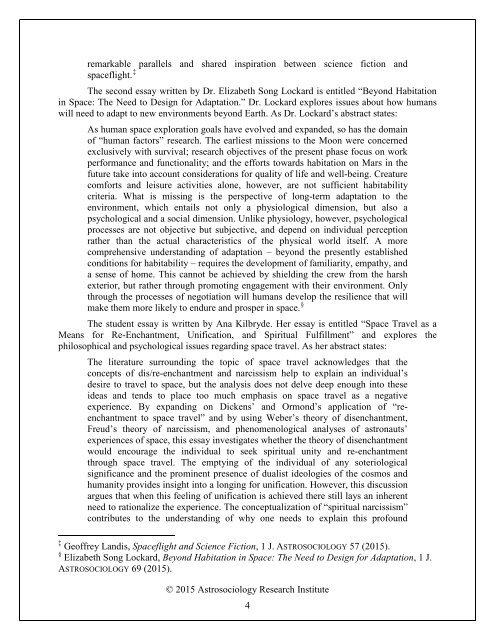THE JOURNAL OF ASTROSOCIOLOGY VOLUME 1
qd9nb3s
qd9nb3s
- No tags were found...
Create successful ePaper yourself
Turn your PDF publications into a flip-book with our unique Google optimized e-Paper software.
emarkable parallels and shared inspiration between science fiction andspaceflight. ‡The second essay written by Dr. Elizabeth Song Lockard is entitled “Beyond Habitationin Space: The Need to Design for Adaptation.” Dr. Lockard explores issues about how humanswill need to adapt to new environments beyond Earth. As Dr. Lockard’s abstract states:As human space exploration goals have evolved and expanded, so has the domainof “human factors” research. The earliest missions to the Moon were concernedexclusively with survival; research objectives of the present phase focus on workperformance and functionality; and the efforts towards habitation on Mars in thefuture take into account considerations for quality of life and well-being. Creaturecomforts and leisure activities alone, however, are not sufficient habitabilitycriteria. What is missing is the perspective of long-term adaptation to theenvironment, which entails not only a physiological dimension, but also apsychological and a social dimension. Unlike physiology, however, psychologicalprocesses are not objective but subjective, and depend on individual perceptionrather than the actual characteristics of the physical world itself. A morecomprehensive understanding of adaptation – beyond the presently establishedconditions for habitability – requires the development of familiarity, empathy, anda sense of home. This cannot be achieved by shielding the crew from the harshexterior, but rather through promoting engagement with their environment. Onlythrough the processes of negotiation will humans develop the resilience that willmake them more likely to endure and prosper in space. §The student essay is written by Ana Kilbryde. Her essay is entitled “Space Travel as aMeans for Re-Enchantment, Unification, and Spiritual Fulfillment” and explores thephilosophical and psychological issues regarding space travel. As her abstract states:The literature surrounding the topic of space travel acknowledges that theconcepts of dis/re-enchantment and narcissism help to explain an individual’sdesire to travel to space, but the analysis does not delve deep enough into theseideas and tends to place too much emphasis on space travel as a negativeexperience. By expanding on Dickens’ and Ormond’s application of “reenchantmentto space travel” and by using Weber’s theory of disenchantment,Freud’s theory of narcissism, and phenomenological analyses of astronauts’experiences of space, this essay investigates whether the theory of disenchantmentwould encourage the individual to seek spiritual unity and re-enchantmentthrough space travel. The emptying of the individual of any soteriologicalsignificance and the prominent presence of dualist ideologies of the cosmos andhumanity provides insight into a longing for unification. However, this discussionargues that when this feeling of unification is achieved there still lays an inherentneed to rationalize the experience. The conceptualization of “spiritual narcissism”contributes to the understanding of why one needs to explain this profound‡ Geoffrey Landis, Spaceflight and Science Fiction, 1 J. <strong>ASTROSOCIOLOGY</strong> 57 (2015).§ Elizabeth Song Lockard, Beyond Habitation in Space: The Need to Design for Adaptation, 1 J.<strong>ASTROSOCIOLOGY</strong> 69 (2015).© 2015 Astrosociology Research Institute4


